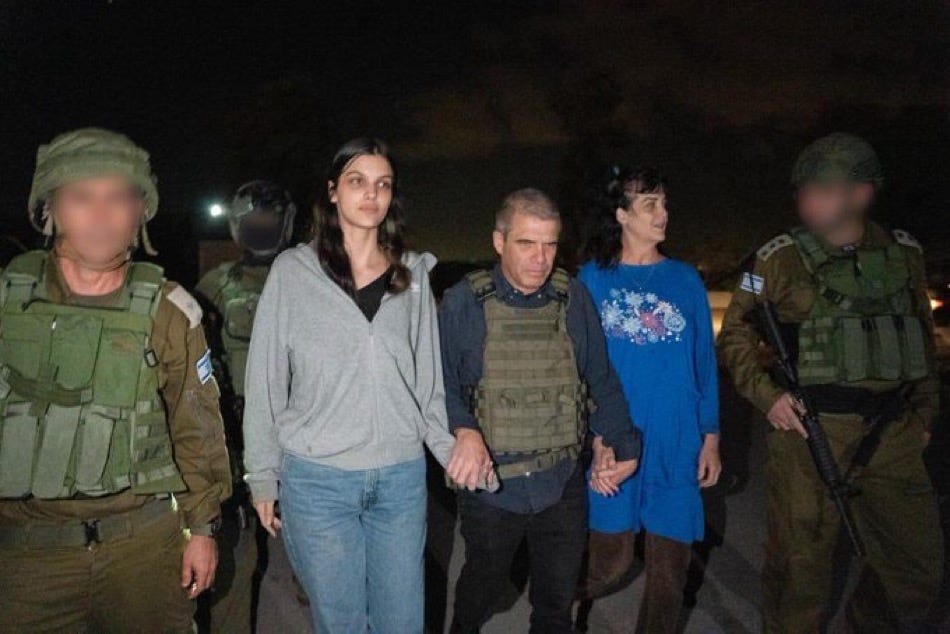Day 15 Gaza War:War Plans,2 Hostages Released, Fighting Continues in the North
Tel Aviv Dairy October 21, 2023
Yesterday marked the first day when no Hamas rockets targeted Tel Aviv. However, this peace was disrupted today during my Shabbat nap, as Hamas fired missiles towards the Tel Aviv area. Earlier in the day, missiles were directed towards the vicinity of Ben Gurion Airport.
It’s estimated that Hamas has launched approximately 7,000 rockets, to date — 550 of which malfunctioned and fell upon launch. The frequency of Hamas's missile attacks has noticeably been on the decline. This does not necessarily indicate a depletion of their missile arsenal, but is evidence their stockpile is dwindling. In addition to those missiles intercepted by Iron Dome, some missiles have been thwarted and destroyed by our Air Force.
In the North, several anti-tank missiles were launched into Israel from Lebanon, along with mortar fire targeting Har Dov. In response, Israel launched counterattacks against eight groups responsible for these missile launches, resulting in the deaths of several Hezbollah fighters.
Over the past few days, the situation in Israel’s northern communities has remained relatively stable. Israel has communicated its stance regarding the north: as long as Hezbollah's aggressions remain confined to the confrontation line, Israel will refrain from launching strikes deep strikes into Lebanon. In anticipation of potential escalation on our northern border, cities and towns along this confrontation line have been evacuated. Just yesterday, Kiryat Shmonah was among the places evacuated. A few residents remain in these towns, either due to provide essential services, or because they are physically unable to leave.
The prevailing sentiment in Israel is that Hezbollah is not seeking a full-scale war. Although it is anticipated that if Israel does proceed with a ground incursion into Gaza, Hezbollah might intensify its confrontations along the aforementioned line — but not beyond a certain limit. Of course, this prediction is based on current assessments. Following the profound intelligence failure on October 7th, there's a general reluctance to make definitive predictions, however, what I wrote above is the most informed estimate at the moment.
Today, the first 20 trucks carrying humanitarian aid entered Gaza. While the New York Times reported that the trucks weren't inspected, the IDF claims they were. A UN spokesperson noted that all future shipments will undergo inspection.
Israeli troops are now prepared for a ground incursion into Gaza. Having learned from previous confrontations, IDF troops are positioned at a safer distance from the border to avoid being within range of mortars and short-range rockets from Gaza. The Commander of the Air Force addressed the corp’s pilots today, informing them that their imminent task will be to fully support the ground forces set to enter Gaza.
Heeding the IDF warnings, 750,000 Gazans have relocated southward up to this point, leaving behind approximately 350,000 individuals. The remaining population could potentially delay Israel’s ground operation.
Defense Minister Galant outlined a three-stage strategy for the attack on Gaza. The initial phase will focus on diminishing Hamas's military power. The second stage, will target locating and eradicating remaining Hamas elements. During the final stage, control of Gaza will be handed over to a third party — however, Israel will retain the right to intervene if any residual Hamas activities are detected.
Current projections suggest that the conflict in Gaza might last for three months. Reservists have been informed by their superiors to anticipate a three-month mobilization. Concurrently, residents of the Kibbutzim surrounding Gaza have been advised to prepare for a three-month stay in hotels.
Last night, Hamas released two American women they held captive, framing it as “a humanitarian act”.
The exact reason behind this action remains uncertain. Although it's plausible that Hamas’s aim was to postpone Israel’s impending ground assault. Hamas appears to operate under the assumption that holding hostages will ensure their continued governance in Gaza, a notion that is being challenged.
Following their release, the two American hostages communicated with President Biden. This evening, Hamas purportedly proposed the release of two very elderly Israeli hostages, which Israel allegedly declined. The exact circumstances surrounding this offer remain nebulous, but it seems to be a tactic in their psychological warfare.
Hostage families are persistently working to maintain public awareness about their kin. The families organized a protest tonight outside IDF headquarters. On Friday evening, the families arranged a symbolic 202-seat empty table at the Israeli Museum, representing the 202 hostages. Sadly, the IDF clarified tonight that the confirmed hostage count now stands at 210, a figure expected to rise
.
Lastly, regarding the assault from Yemen on Thursday night: It has been revealed that the Houthi rebels launched four missiles and 14 UAVs targeting Israel, with potential threats to Saudi Arabia and possibly U.S. locations. Collaboratively, the U.S. Navy and Saudi forces neutralized these threats.
•••∞•••
I'd like to share my thoughts on two articles from The New York Times published over the past couple of days.
The first, from today's paper, is by Gershon Baskin. I know him in passing and have been reading his work for years. Baskin aligns with the far-left of the Israeli Zionist political spectrum. He played a role in the negotiations for Gilad Shalit's release and has attempted to help negotiate the release of some of the current hostages. Several days ago, I cited here his recent comments on TV, where Baskin stated that Hamas seemed unaware of the impact their actions have had on Israel. Baskin is quite pessimistic about the prospects of reaching an agreement. He feels that the most probable outcome is that Israeli special forces will rescue some of the hostages during a ground invasion. Notably, Baskin doesn't state in the article that Israel should refrain from a ground operation.
Baskin’s assessment contrasts with the views of Thomas Friedman, whom I generally hold in high regard. Friedman wrote.. “If Israel were to announce today that it has decided for now to forgo an invasion of Gaza and will look for more surgical means to eliminate or capture Hamas’s leadership while trying to engineer a trade for the more than 150 Israeli and other hostages whom Hamas is holding, it would not only avoid further traumatizing its own society, as well as Palestinian civilians in Gaza; it would also give Israel and its allies time to think through how to build — with Palestinians — a legitimate alternative to Hamas. Such a move would earn Israel a lot of support globally and enable the world to see Hamas for what it is: the ISIS of the Palestinian territories.”
The perspective presented in Friedman's article seems so detached from the Israeli reality that I'm compelled to question whether he truly comprehends Israel's situation. Israel's potential incursion into Gaza isn't driven by a desire for revenge. Instead, it stems from a consensus across the Israeli Jewish society that coexistence with a neighboring state governed by terrorists is absolutely untenable. Any such arrangement is bound to fail, and there is nearly total agreement is that the only viable path forward is to end Hamas's dominion over Gaza. Without the disappearance of Hamas from Gaza, Israeli residents will not return to the communities surrounding Gaza, and the broader populace won't feel secure. The timing and strategy of a ground assault are matters of military tactics, but Friedman seems to be out of touch with the lived experience of Israelis in the aftermath of October 7th.
I must emphasize once more: Israel's stance isn't about retaliation. It's a calculated determination that Hamas, both as a military and a governmental entity, must be dismantled.






Thank you for your information. I confess I am a Canadian and not very cognizant of the nuances that are the Israeli Gaza situation BUT I do not see how Israel can even consider allowing a murderous group of peoples within distance of its borders. Perhaps a third country needs to be the buffer- a peace keeping force!